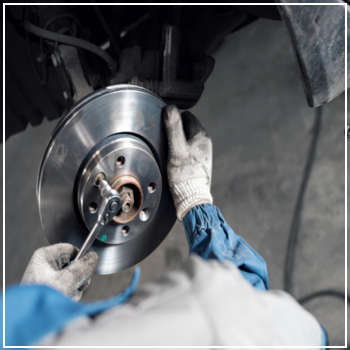7 Signs of Serious Brake Issues
Brakes are essential for controlling your vehicle’s speed and bringing it to a stop. Most modern cars use disc brakes, which consist of a rotor (a metal disc) behind each wheel and a caliper that holds the brake pads. When you press the brake pedal, hydraulic pressure forces the caliper to clamp down on the rotor, creating friction that slows the wheel. Over time, the brake pads wear down due to this constant friction, which is why regular maintenance is so important. If the pads become too thin, they can no longer provide enough stopping power, and you may notice unusual noises or vibrations. Ignoring these signs can lead to more serious damage, like warped rotors or damaged calipers, which can be expensive to fix. Unusual sounds when braking are never normal. Squeaking often means your brake pads are worn and need replacement. If you hear a grinding noise, it could mean the metal backing plate of the pad is rubbing against the rotor—this is a serious issue that requires immediate attention. These sounds can also indicate that your rotors are damaged and may need resurfacing or replacement. If you feel a vibration in the brake pedal or steering wheel when you apply the brakes, it could be a sign of warped rotors. This happens when the rotors get overheated or unevenly worn. It can also be caused by misalignment, so it’s best to have a professional check both the alignment and the condition of your brake components. A clicking sound when you brake usually means something is loose in the brake system. It could be a clip or pin that holds the brake pad in place. If left unchecked, this can cause further damage to other parts of the braking system. A mechanic can quickly identify and fix this issue before it becomes worse. If you find yourself pressing harder on the brake pedal than usual, it’s a clear sign that your brake pads are wearing down. You might also notice that your foot has to travel further before the brakes engage. This is not just an inconvenience—it’s a safety concern. As the pads continue to wear, your braking performance will decrease, increasing the risk of accidents. In some cases, a spongy or soft brake pedal could indicate a leak in the brake fluid system. Check under your car after parking—if you see a dark, oily puddle, it could be brake fluid. This is a serious issue that needs to be addressed immediately. If your car pulls to one side when you brake, it could be due to uneven brake pad wear, a faulty caliper, or contaminated brake fluid. This issue can put extra stress on your steering system over time, leading to problems with ball joints, tie rods, and bearings. It’s important to have this checked as soon as possible. If the brake warning light comes on, it’s a signal that something is wrong. This could mean your brake pads are worn, your fluid level is low, or there’s a problem with the ABS system. Always take this seriously and have your car inspected by a qualified technician. Checking the thickness of your brake pads is a simple way to determine if they need replacing—ideally, they should be at least a quarter inch thick. A burning smell coming from your car while braking is a red flag. It usually means your brakes are overheating, which can happen if the pads are worn or if the calipers are sticking. This is a dangerous situation—your car is no longer safe to drive. If you notice this smell, pull over safely and call for roadside assistance right away. Don’t ignore the warning signs. Regular brake inspections can save you money and protect your safety. If you’re experiencing any of these issues, contact DaSilva’s Auto Body today. Our experienced technicians can diagnose the problem and recommend the right repairs. Schedule an appointment now and keep your brakes in top shape. Pet Preform Injection Mold,Blow Bottle Machine,Jar Can Mold,Pet Water Preform Taizhou Langshun Trade Co.,ltd , https://www.longthinmachinery.com Your car's braking system is one of the most important parts of your vehicle, yet it often goes unnoticed until something goes wrong. Don't wait for a problem to escalate—regular brake checks can prevent costly repairs and keep you safe on the road.
Your car's braking system is one of the most important parts of your vehicle, yet it often goes unnoticed until something goes wrong. Don't wait for a problem to escalate—regular brake checks can prevent costly repairs and keep you safe on the road.How Do Vehicle Brakes Work?
Squeaking, Grinding, or Rubbing Sounds
Vibrations While Braking
Clicking Noises
Need to Press Harder to Stop
Vehicle Pulls to One Side
Brake Warning Light
Burning Smell